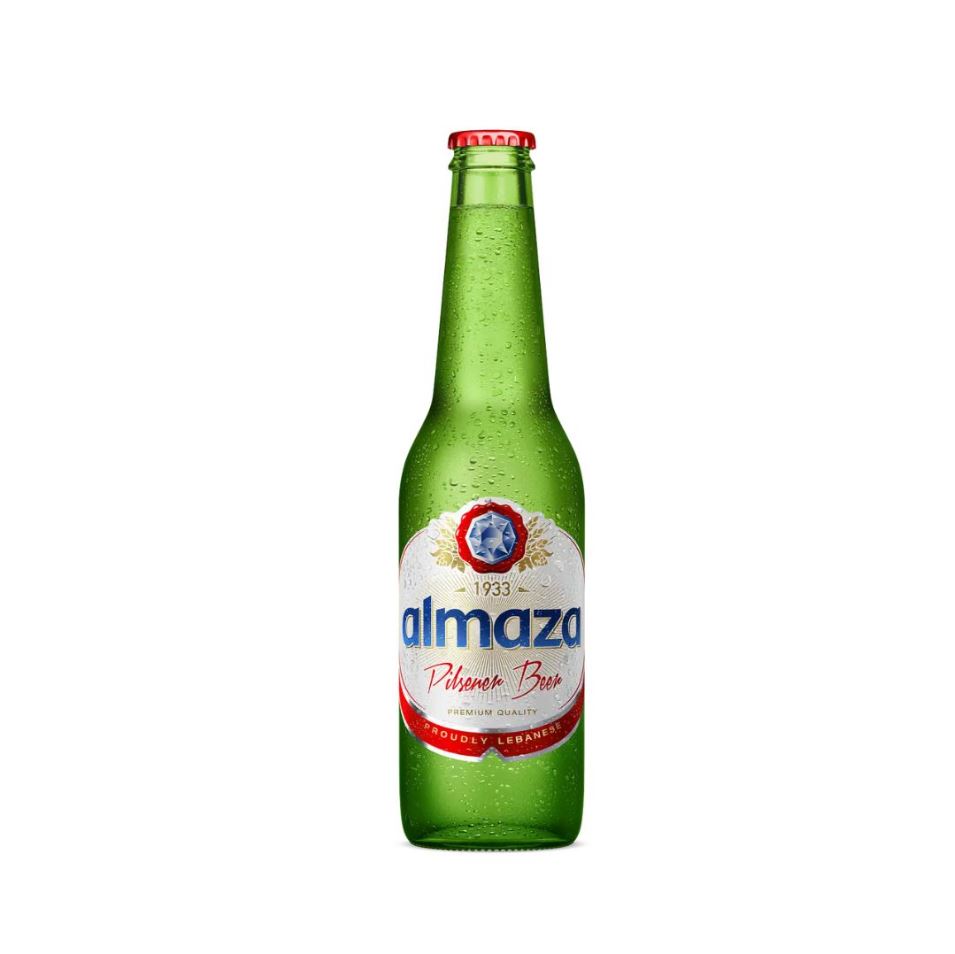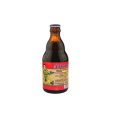Almaza Beer, a prominent figure within the expansive portfolio of Heineken N.V., stands out as a testament to the brewing giant’s global influence and commitment to diversity in its offerings. Heineken, a Dutch brewer known internationally, boasts a portfolio encompassing over 170 beer brands that span a variety of styles and flavors. Among these, Almaza Beer holds a special place, rooted deeply in the cultural fabric of Lebanon where it originated.
Founded in 1933 in Bauchrieh, Lebanon, Almaza (Brasserie Almaza S.A.L.) initially emerged under the name Brasserie Franco-Libano-Syrienne, reflecting the collaborative effort among Lebanese shareholders. Over the decades, Almaza has witnessed the historical tides of the region, from the turmoil of the Lebanese Civil War to the eventual stabilization that allowed it to flourish. In 2021, the brewery saw a significant shift when Philippe Jabre took majority ownership, marking a new chapter in its storied history.
Within Heineken’s portfolio, Almaza Beer not only represents the Lebanese brewing tradition but also illustrates Heineken’s strategy of embracing local brands with deep cultural ties and integrating them into its global network. This approach has allowed Almaza to maintain its unique identity while benefiting from Heineken’s extensive distribution channels, enabling it to reach consumers worldwide, including in markets such as Canada, the United States, the United Kingdom, France, Australia, and various Gulf countries.
Almaza’s sustained popularity is built on a foundation of quality and tradition, qualities that resonate with both local consumers and international aficionados of fine beer. Its flagship product, Almaza Pilsener, continues to be celebrated for its crisp and refreshing taste, embodying the essence of Lebanese craftsmanship under the umbrella of a world-renowned brand. Through its integration into Heineken’s lineup, Almaza Beer exemplifies how local heritage and global reach can blend seamlessly, offering a taste of Lebanon to the world.
| Aspect | Details |
|---|---|
| Background and Ownership | Founded in 1933 in Bauchrieh, Lebanon as Brasserie Franco-Libano-Syrienne, Almaza is a part of Heineken N.V., a Dutch brewing company with over 170 beer brands globally. In 2021, Philippe Jabre took majority ownership, marking a significant shift in its management. |
| Cultural and Historical Significance | Almaza has deep roots in the Lebanese culture and has weathered historical events like the Lebanese Civil War. It represents Lebanese brewing tradition within Heineken’s diverse portfolio. |
| Global Integration | As part of Heineken’s portfolio, Almaza benefits from international distribution channels, making it available in markets including the USA, UK, Canada, France, Australia, and Gulf countries. |
| Product and Popularity | Almaza’s flagship product, Almaza Pilsener, is known for its crisp and refreshing taste, embodying Lebanese craftsmanship while being promoted under the Heineken brand. |
| Local Identity and Global Reach | Almaza exemplifies the integration of local heritage with global reach, maintaining its unique identity while being accessible on a global scale through Heineken’s network. |
Contents
History of Almaza
Almaza Beer, a flagship of Lebanese brewing history, traces its roots back to 1933 when it was founded in Bauchrieh, Lebanon. Originally named Brasserie Franco-Libano-Syrienne, it was established by the Jabre family along with other Lebanese shareholders, epitomizing a fusion of local passion and brewing expertise. The brewery was later renamed to Brasserie et Malterie Almaza during the 1950s and finally to Brasserie Almaza following the tumultuous period of the Lebanese Civil War. This era posed significant challenges, but Almaza withstood the test of times, emerging as a symbol of resilience and continuity in Lebanon’s industrial landscape.

The end of the civil war marked a period of rebuilding and modernization for Almaza. As Lebanon recovered, so did Almaza, strengthening its presence in the local market and beginning to explore international horizons. The turn of the century saw Almaza becoming increasingly recognized as a premium Lebanese beer, not only at home but also abroad.
A significant development occurred in December 2021 when Philippe Jabre assumed majority ownership of the brewery. This transition marked a new era for Almaza, infusing fresh capital and strategic vision into the brand. Under Jabre’s leadership, Almaza is poised to enhance its production capabilities and expand its market reach further, reinforcing its position as a central player in the global beer market within Heineken’s portfolio.
| Timeline | Event |
|---|---|
| 1933 | Founded in Bauchrieh, Lebanon as Brasserie Franco-Libano-Syrienne by the Jabre family and other Lebanese shareholders. |
| 1950s | Renamed to Brasserie et Malterie Almaza. |
| 1975-1990 (Lebanese Civil War) | Renamed to Brasserie Almaza. Despite challenges, Almaza remains a symbol of resilience and continuity in Lebanon’s industrial landscape. |
| Post-Civil War Era | Period of rebuilding and modernization, strengthening local presence and beginning to explore international markets. |
| Early 2000s | Almaza gains recognition as a premium Lebanese beer both domestically and internationally. |
| December 2021 | Philippe Jabre assumes majority ownership, marking a new era of strategic investment and market expansion for Almaza within Heineken’s portfolio. |
Almaza’s Products
Almaza’s beer lineup is a showcase of traditional brewing fused with modern tastes, catering to a diverse clientele. Each product in the lineup has a unique profile, designed to offer something special to beer enthusiasts.
Almaza Pilsener: Available in both 33cl and 50cl bottles, Almaza Pilsener is the brewery’s cornerstone product. Brewed according to traditional pilsner methods, it features a golden hue and a crisp, refreshing taste with a balanced hoppy bitterness. This beer is perfect for those seeking a classic pilsner experience reflective of Lebanese brewing artistry.
Almaza Pure Malt: This variant stands out as a richer, fuller-bodied beer. Made exclusively from malted barley, Almaza Pure Malt offers deeper flavors and a slightly higher alcohol content at 6%, appealing to those who appreciate the robust essence of pure malt.
Al Rayess Beer: Named in honor of the pioneering spirit of the brewery’s founders, Al Rayess is characterized by its 5% alcohol volume and a distinctive blend of hops and malts. It’s designed for the beer connoisseur looking for a premium, well-rounded lager.
Almaza Light: Catering to those who prefer a lighter beer without sacrificing flavor, Almaza Light has a reduced alcohol content of 2.7%. It’s a smooth, easy-drinking option for occasions that call for a subtler beer.

Almaza Radler: Combining beer with lemon, Almaza Radler is a refreshing choice for hot days, offering zest and mild alcoholic content at 2.0%. It’s an excellent choice for those looking for a thirst-quenching beverage that blends the citrusy zest with the mild bitterness of beer.
Laziza Apple Light: A non-alcoholic option that doesn’t skimp on flavor, Laziza Apple Light features a sweet, fruity taste of apples. It’s ideal for those seeking a non-alcoholic beverage with a unique twist.
Almaza Special Dark: For those who venture into the territory of dark beers, Almaza Special Dark offers a 6.0% alcohol volume and a rich, complex flavor profile. It combines the sweetness of dark malts with a hint of hop bitterness, making it a full-bodied beer suitable for discerning palates.
Each of these products embodies Almaza’s commitment to quality and innovation, ensuring that every sip reflects the brewery’s rich heritage and forward-looking vision. Whether light or dark, alcoholic or non-alcoholic, Almaza continues to serve a wide range of tastes with its varied beer selection.
| Beer | Description |
|---|---|
| Almaza Pilsener | A traditional pilsner with a golden hue and a crisp, refreshing taste. Available in 33cl and 50cl bottles, offering a balanced hoppy bitterness reflective of Lebanese brewing. |
| Almaza Pure Malt | A richer, fuller-bodied beer made exclusively from malted barley. It features deeper flavors and a slightly higher alcohol content at 6%. |
| Al Rayess Beer | A premium lager with a 5% alcohol volume, named after the brewery’s founders. It offers a distinctive blend of hops and malts for the discerning connoisseur. |
| Almaza Light | A lighter beer with a reduced alcohol content of 2.7%, designed for smooth, easy drinking without sacrificing flavor. |
| Almaza Radler | A refreshing blend of beer and lemon, perfect for hot days with a mild alcoholic content of 2.0%. It offers a thirst-quenching, citrusy zest. |
| Laziza Apple Light | A non-alcoholic beer with a sweet, fruity taste of apples, ideal for those seeking a flavorful non-alcoholic option. |
| Almaza Special Dark | A dark beer with a 6.0% alcohol volume, combining the sweetness of dark malts with a hint of hop bitterness, suitable for those who enjoy a full-bodied flavor. |
Market and Export Strategy
Almaza has long been a staple in Lebanon, not only as a popular beer choice but also as a significant contributor to the local economy. Its brewery, situated in the heart of Lebanon, has provided employment opportunities and has been a part of the economic backbone in the region. The brand’s deep-rooted presence is seen in its widespread availability—from small local taverns to major supermarkets across the country. This widespread distribution ensures that Almaza remains at the forefront of the Lebanese beer market, continually reinforcing its identity as a household name.
Beyond its domestic success, Almaza has developed a strategic export strategy that targets several key markets around the world, including Canada, the United States, the United Kingdom, France, Australia, and various Gulf countries. This international approach is driven by the global diaspora of Lebanese expatriates and a growing interest in unique, international beers among global consumers. Almaza leverages Lebanon’s positive national image to promote its beers, which are often associated with Lebanese craftsmanship and quality.

The brand’s export strategy involves tailoring its marketing efforts to appeal to the tastes and preferences of each distinct market. For instance, in markets with a large Lebanese community, such as Canada and Australia, Almaza emphasizes its cultural heritage. In contrast, in broader international markets like the UK and the US, it positions itself as a premium foreign beer that offers a taste of Lebanese tradition. This nuanced marketing approach has enabled Almaza to establish a solid presence in highly competitive beer markets around the world.
| Aspect | Details |
|---|---|
| Local Impact | Almaza’s brewery in Lebanon provides vital employment opportunities and supports the local economy. The brand is extensively available across Lebanon, from local taverns to major supermarkets, maintaining its status as a household name. |
| Global Reach | Targets key international markets, including Canada, the US, the UK, France, Australia, and Gulf countries, capitalizing on the global Lebanese diaspora and the rising popularity of international craft beers. |
| Export Strategy | Almaza uses tailored marketing strategies to suit the tastes of each market. It emphasizes Lebanese heritage in areas with significant Lebanese communities, while in broader markets, it positions itself as a premium foreign beer showcasing Lebanese tradition. |
Cultural and Social Impact
Almaza’s impact on Lebanese society extends far beyond its economic contributions. As one of Lebanon’s oldest and most beloved brands, Almaza holds a special place in the cultural and social fabric of the country. It is more than just a beer; it is a symbol of Lebanese hospitality and joyous gatherings. The brand resonates with both the youth and older generations, making it a common feature at various social events, from casual meetups to elaborate weddings.
The brewery has adeptly used marketing strategies to strengthen and communicate its cultural connections. One of the most effective strategies has been the use of nostalgia in advertising. Almaza frequently references Lebanese traditions, landscapes, and historical moments in its campaigns, which not only evoke a sense of pride among the Lebanese people but also build a strong emotional connection with the brand.
Moreover, Almaza has been involved in various cultural sponsorships and events that align with its brand identity. For instance, it has sponsored music festivals and art shows, providing a platform for local artists and musicians to showcase their talents. These sponsorships are carefully chosen to reflect the brand’s values of community support and cultural celebration.
In addition to traditional advertising, Almaza has embraced digital marketing to engage with a younger audience. Social media campaigns featuring interactive content and engaging with local trends have proven successful in maintaining the brand’s relevance among younger demographics. One notable campaign involved users submitting their designs for a limited edition Almaza bottle, which not only engaged customers creatively but also fostered a deeper connection to the brand.
In conclusion, Almaza’s presence in Lebanon is multifaceted. Domestically, it is a cornerstone of the local economy and a beloved cultural icon. Internationally, it serves as a bridge connecting Lebanese expatriates with their heritage, while introducing the global community to the rich tastes of Lebanon. The brand’s thoughtful marketing strategies and cultural engagements have significantly contributed to its enduring success and deep societal impact.
| Aspect | Details |
|---|---|
| Cultural Symbol | Almaza is a symbol of Lebanese hospitality and is commonly featured at various social events. It resonates across generations, reinforcing its position as a cultural icon in Lebanon. |
| Marketing Strategies | The brewery utilizes nostalgia in its advertising, referencing Lebanese traditions, landscapes, and historical moments, which strengthens emotional connections with the brand. |
| Cultural Sponsorships | Almaza sponsors music festivals and art shows, supporting local artists and reflecting its values of community support and cultural celebration. |
| Digital Engagement | Engages younger audiences through digital marketing and social media, including interactive campaigns like designing a limited edition Almaza bottle, which fosters customer involvement and brand loyalty. |
| Global Connection | Internationally, Almaza connects Lebanese expatriates to their heritage and introduces global consumers to Lebanese brewing traditions, enhancing its international presence. |
Challenges and Opportunities
Almaza, like any major brand, faces its share of challenges that impact its operation and growth prospects. One of the primary hurdles is the intense market competition, not only locally from other breweries in Lebanon but also internationally from global beer giants that dominate broader markets. As consumer preferences evolve and new trends emerge, Almaza must continually innovate to maintain its market position and appeal to a changing demographic.

Political instability in Lebanon presents another significant challenge. The economic crises, fluctuating currency rates, and periods of political turmoil can disrupt production, supply chains, and sales. These conditions necessitate a robust crisis management strategy to ensure continuity of operations and safeguard the brand’s market share during uncertain times.
Despite these challenges, Almaza also encounters substantial opportunities that can propel growth and solidify its standing both locally and internationally. Internationally, there is a rising trend towards ethnic and craft beers, which Almaza can capitalize on due to its authentic Lebanese roots and established brand heritage. Expanding its footprint in markets with a growing interest in craft and specialty beers, such as Europe and North America, could significantly boost its global presence.
Another opportunity lies in diversifying its product line to include more specialty beers that cater to the global palate. For instance, introducing a line of craft-style ales or experimenting with local Lebanese ingredients could attract beer enthusiasts looking for unique flavors and stories. Additionally, non-alcoholic versions of its popular beers could cater to a growing segment of health-conscious consumers and regions with cultural restrictions on alcohol.
| Challenges | Opportunities |
|---|---|
| Market Competition | Ethnic and Craft Beer Trend |
| Intense competition from both local breweries and international beer giants, requiring ongoing innovation to stay relevant as consumer preferences evolve. | Capitalizing on the global interest in ethnic and craft beers, leveraging Almaza’s authentic Lebanese heritage and established brand to expand into new international markets. |
| Political Instability | Product Line Diversification |
| Economic crises and political turmoil in Lebanon can disrupt production and supply chains, necessitating a robust crisis management strategy. | Introducing specialty beers with unique flavors, such as craft-style ales using local ingredients, and non-alcoholic versions to appeal to health-conscious consumers and markets with alcohol restrictions. |
Throughout its long history, Almaza has not only contributed significantly to the Lebanese beer market but has also made notable inroads into global markets. Its ability to maintain a strong identity as a Lebanese beer while appealing to an international audience is a testament to its strategic marketing and brand management. Almaza has become synonymous with Lebanese culture, offering a taste of Lebanon to the world through its various beer offerings.
Reflecting on the brand’s journey, Almaza’s resilience and adaptability stand out. It has navigated through numerous challenges, including economic downturns and political unrest, yet has managed to grow and thrive. The brewery’s proactive approach in adapting to market conditions and consumer preferences has ensured its ongoing relevance and competitiveness.
Almaza’s story is one of enduring presence and continuous evolution. As it moves forward, the brand looks set to continue its legacy of innovation and cultural representation, cementing its role not just as a brewer of beer, but as a bearer of Lebanese heritage on the global stage. The future holds promising prospects for Almaza, as it continues to adapt, innovate, and expand its horizons, embodying the spirit of Lebanon in each bottle.




